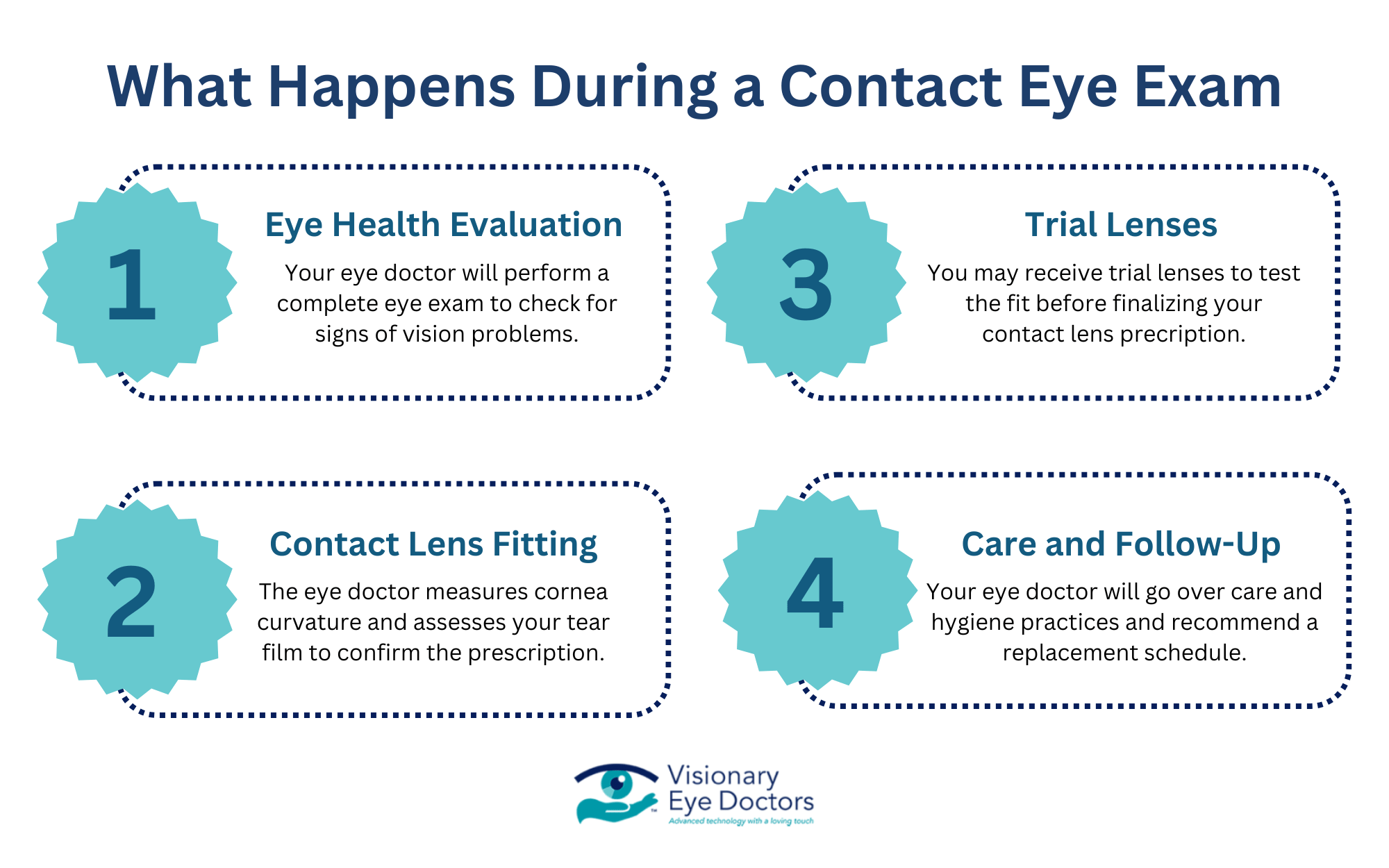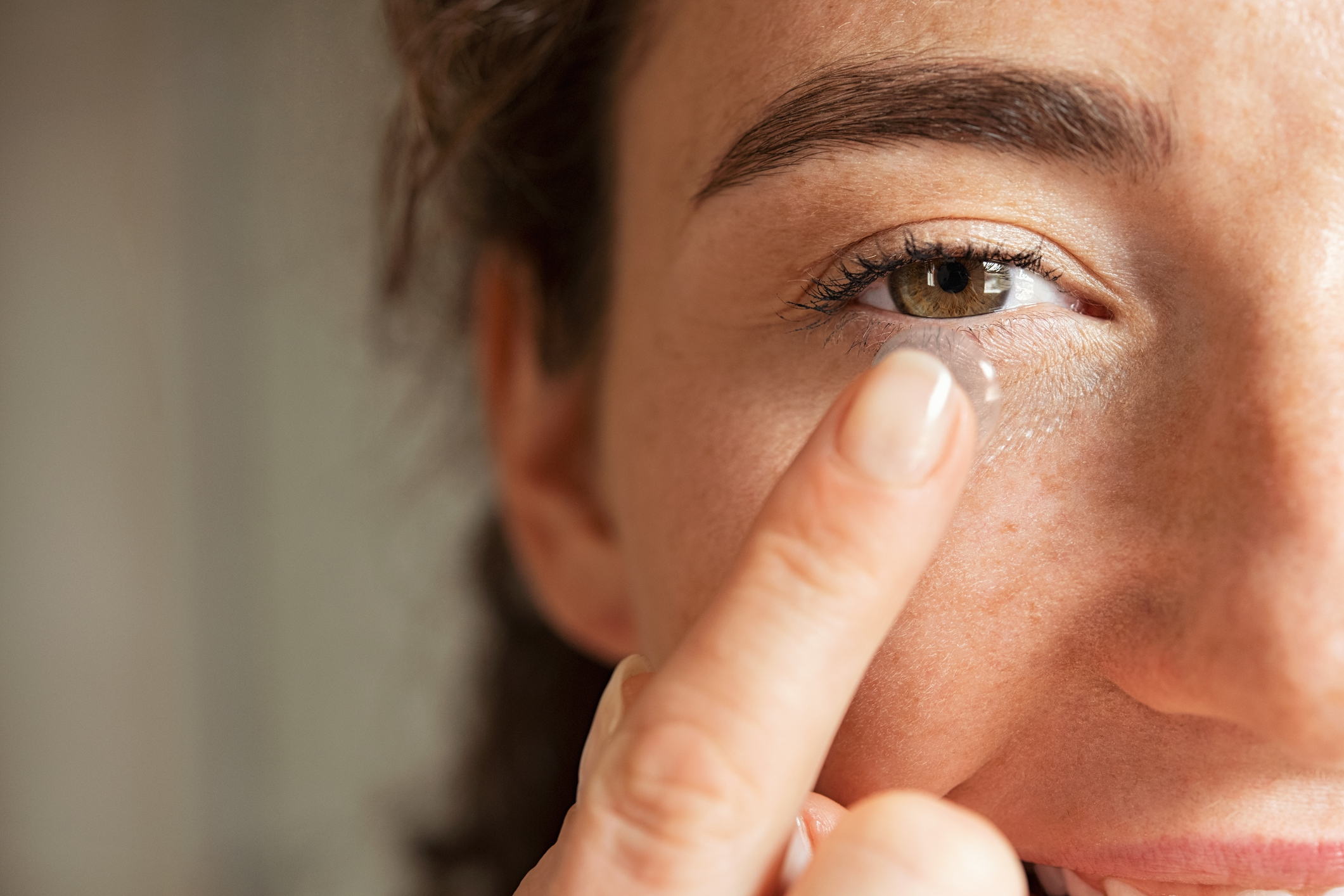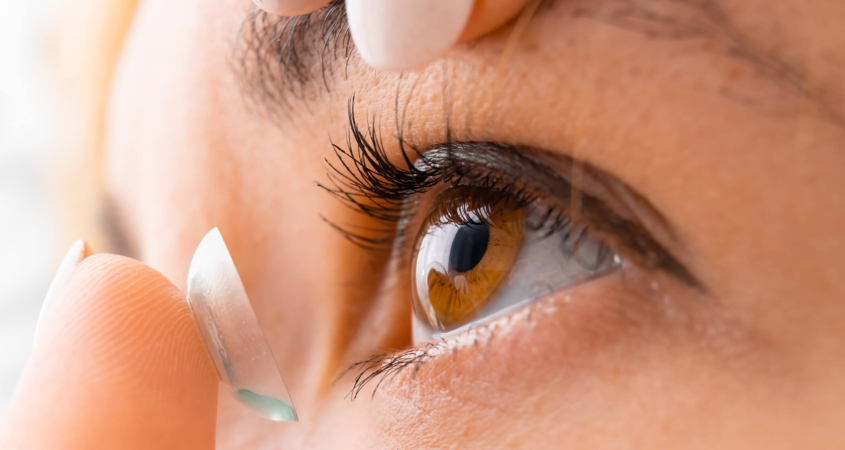Do I Really Need a Contact Eye Exam Every Year?
Yes, an annual contact lens exam is recommended for most contact lens wearers to protect eye health, maintain an accurate prescription, and detect any underlying vision problems. Even if your vision seems fine, regular exams help prevent issues like dry eye, corneal ulcers, and other eye conditions that may not have obvious symptoms.
Many people believe that once they have a contact lens prescription, they can continue using the same lenses indefinitely. However, vision changes and general wear and tear on the eyes can make old prescriptions ineffective or even unsafe.
The Importance of an Annual Contact Eye Exam
An annual eye exam isn’t just about updating your contact lens prescription – it’s an important step in protecting your eye health.
Unlike glasses, contact lenses sit directly on the eye, making wearers more susceptible to dry eye and irritation. Over time, even a well-fitted contact lens can cause subtle changes to the cornea, which may lead to discomfort if not properly monitored.
Another key reason for regular checkups is that vision changes can occur gradually. Even minor prescription shifts can lead to eye strain, headaches, or blurry vision.
What an Annual Exam Can Detect
Even if you don’t notice any changes in your vision, an annual exam can help detect:
- Refractive errors that require adjustments for perfect vision
- Dry eye syndrome
- Early signs of macular degeneration, diabetic retinopathy, or corneal ulcers
- Risk factors for vision loss, especially for those with high blood pressure or diabetes
Skipping a routine vision screening increases the risk of wearing an outdated or incorrect lens prescription, which can cause discomfort and vision problems over time. Regular exams provide an opportunity to catch issues early and adjust your vision correction as needed.
What Happens During a Contact Lens Exam?
A contact lens exam is a comprehensive evaluation that ensures your lenses fit properly, your prescription is up to date, and your eye health is protected. Unlike a regular eye exam, a contact lens exam includes additional steps to assess how your lenses interact with your eyes and whether adjustments are needed.
Step 1. Eye Health Evaluation
Before checking your prescription, your eye doctor will perform a complete eye exam to assess your overall eye health. This includes:
- Checking for vision problems
- Examining the optic nerve for early stages of glaucoma or macular degeneration
- Looking for symptoms of dry eye, corneal ulcers, or diabetic retinopathy
Step 2. Contact Lens Fitting
Not all contact lenses are the same, and an improper fit can lead to eye irritation, blurry vision, or discomfort. During this stage, your eye doctor will:
- Measure the curvature of your cornea to ensure the correct lens fit
- Assess your tear film to check for dry eye issues
- Update your contact lens prescription based on your latest vision examination
Even slight changes in your visual acuity can impact how well your lenses perform, which is why keeping your lens prescription current is essential.
Step 3. Trial Lenses and Final Adjustments
If you’re switching to a new type of contact lens, your eye doctor may provide trial lenses to test the fit before finalizing your prescription. They will evaluate:
- How well the lenses settle on your eyes
- Whether they provide clear and stable vision correction
- Any signs of discomfort
Step 4. Care and Follow-Up
To help maintain eye health and prevent infections, your eye doctor will go over:
- Proper contact lens care and hygiene practices
- Recommended replacement schedule for your lenses
- When to schedule your next annual exam or more frequent regular checkups if needed
By the end of the contact lens exam, you’ll have a personalized plan for vision correction that ensures clarity and comfort.
Who Needs More Frequent Contact Lens Exams?
While an annual eye exam is recommended, some individuals may need more frequent checkups to ensure their lenses remain safe and effective.
People at a Higher Risk for Eye Conditions
- Young children: Their vision changes more rapidly, making frequent eye exams essential to ensure their contact lenses remain effective.
- Individuals with health conditions: Conditions like diabetes, high blood pressure, or autoimmune diseases can increase the risk of vision problems or complications from contact lenses.
- People prone to dry eye: Contact lens wearers with dry eye may need adjustments in lens material or prescription to maintain comfort and prevent irritation.
Signs You Should Schedule an Exam Sooner
Even if you don’t fall into a high-risk group, certain symptoms indicate that you should see an eye doctor sooner:
- Frequent headaches or blurry vision
- Redness, irritation, or discomfort while wearing contact lenses
- Light sensitivity or difficulty seeing at night
- A history of eye infections
Many vision insurance plans cover annual eye exams, but some policies allow for more frequent checkups for those with higher risk factors. Checking your insurance coverage can help determine whether you qualify for additional regular checkups at little or no extra cost.

Why Choose Visionary Eye Doctors for Your Next Comprehensive Eye Exam
Your eye health is too important to leave to chance. At Visionary Eye Doctors, we provide comprehensive contact lens exams to protect your vision, comfort, and overall eye health. Whether you need a routine eye exam or adjustments to your prescription, our eye doctors are here to help.
Advanced Technology for Comprehensive Exams
We use the latest diagnostic tools to:
- Detect early signs of macular degeneration, diabetic retinopathy, and other eye conditions
- Measure visual acuity and update your prescription for optimal vision correction
- Evaluate your corneal health to address dry eye concerns
Wide Selection of Contact Lens Options
Not all contact lenses are the same. We offer a variety of lens options, including:
- Bifocal or multifocal lenses
- Colored or special-effect contacts
- Daily disposable lenses
- Extended wear soft lenses
- Toric lenses for astigmatism
- Rigid, gas permeable lenses
- Scleral lenses
- Lenses for dry eye
- Specialty lenses designed specifically for keratoconus
Schedule Your Contact Lens Exam Today
Protect your vision and eye health with a thorough contact lens exam at Visionary Eye Doctors in the Washington, DC and Maryland area. Whether you’re experiencing vision changes, discomfort, or just need an updated prescription, our team is here to provide the best care possible.
Book your appointment today and experience expert eye care tailored to you.



